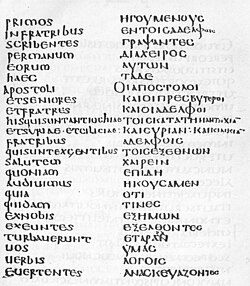Acts 28
| Acts 28 | |
|---|---|
Romans 1 → | |
 Acts 15:22-24 in Latin (left column) and Greek (right column) in Codex Laudianus, written about AD 550. | |
| Book | Acts of the Apostles |
| Category | Church history |
| Christian Bible part | New Testament |
| Order in the Christian part | 5 |
Acts 28 is the twenty-eighth (and also the last) chapter of the Acts of the Apostles in the New Testament of the Christian Bible. It records the journey of Paul from Malta to Italy until finally settled in Rome.[1] The book containing this chapter is anonymous, but early Christian tradition uniformly affirmed that Luke composed this book as well as the Gospel of Luke.[2]
Text
The original text is written in Koine Greek and is divided into 31 verses. Some most ancient manuscripts containing this chapter are:
- Codex Vaticanus (AD 325-350)
- Codex Sinaiticus (AD 330-360)
- Codex Bezae (ca. AD 400)
- Codex Alexandrinus (ca. AD 400-440)
- Codex Ephraemi Rescriptus (ca. AD 450; extant 1-4)
- Codex Laudianus (ca. AD 550; extant: verses 27-31)
Location
This chapter mentions or alludes to the following places (in order of appearance):
Structure
In the New King James Version, this chapter is sub-divided as:
- Acts 28:1–10 = Paul’s Ministry on Malta
- Acts 28:11–16 = Arrival at Rome
- Acts 28:17–31 = Paul’s Ministry at Rome
Cross references
Verse 8
The Pulpit Commentary noted that "the terms here used are all professional ones. [Πυρετός] Error: {{Lang-xx}}: text has italic markup (help), in the plural, is of frequent occurrence in Hippocrates, Aretaeus, and Galen, but elsewhere in the New Testament always in the singular; [δυσεντερία] Error: {{Lang-xx}}: text has italic markup (help), only found here in the New Testament, is the regular technical word for a "dysentery," and is frequently in medical writers coupled with [πυρετοί or πυρετός] Error: {{Lang-xx}}: text has italic markup (help), as indicating different stages of the same illness.[3]
The Ethiopic version of Acts adds after "Paul went in to him and prayed", "and he entreated him to put his hand upon him" meaning either that Publius asked this favour of the apostle for his father, having heard of the affair of the viper, from whence he concluded there was something divine and extraordinary in him; or the father of Publius asked this for himself.[4]
Verse 31
The narrative of Acts ends with Paul:
- preaching the kingdom of God and teaching the things which concern the Lord Jesus Christ with all confidence, no one forbidding him.[5]
See also
References
- ^ Halley, Henry H. Halley's Bible Handbook: an abbreviated Bible commentary. 23rd edition. Zondervan Publishing House. 1962.
- ^ Holman Illustrated Bible Handbook. Holman Bible Publishers, Nashville, Tennessee. 2012.
- ^ Pulpit Commentary on Acts 28 http://biblehub.com/commentaries/pulpit/acts/28.htm accessed 21 October 2015
- ^ Gill, J., Gill's Exposition of the Entire Bible on Acts 28 http://biblehub.com/commentaries/gill/acts/28.htm accessed 21 October 2015
- ^ Acts 28:31
